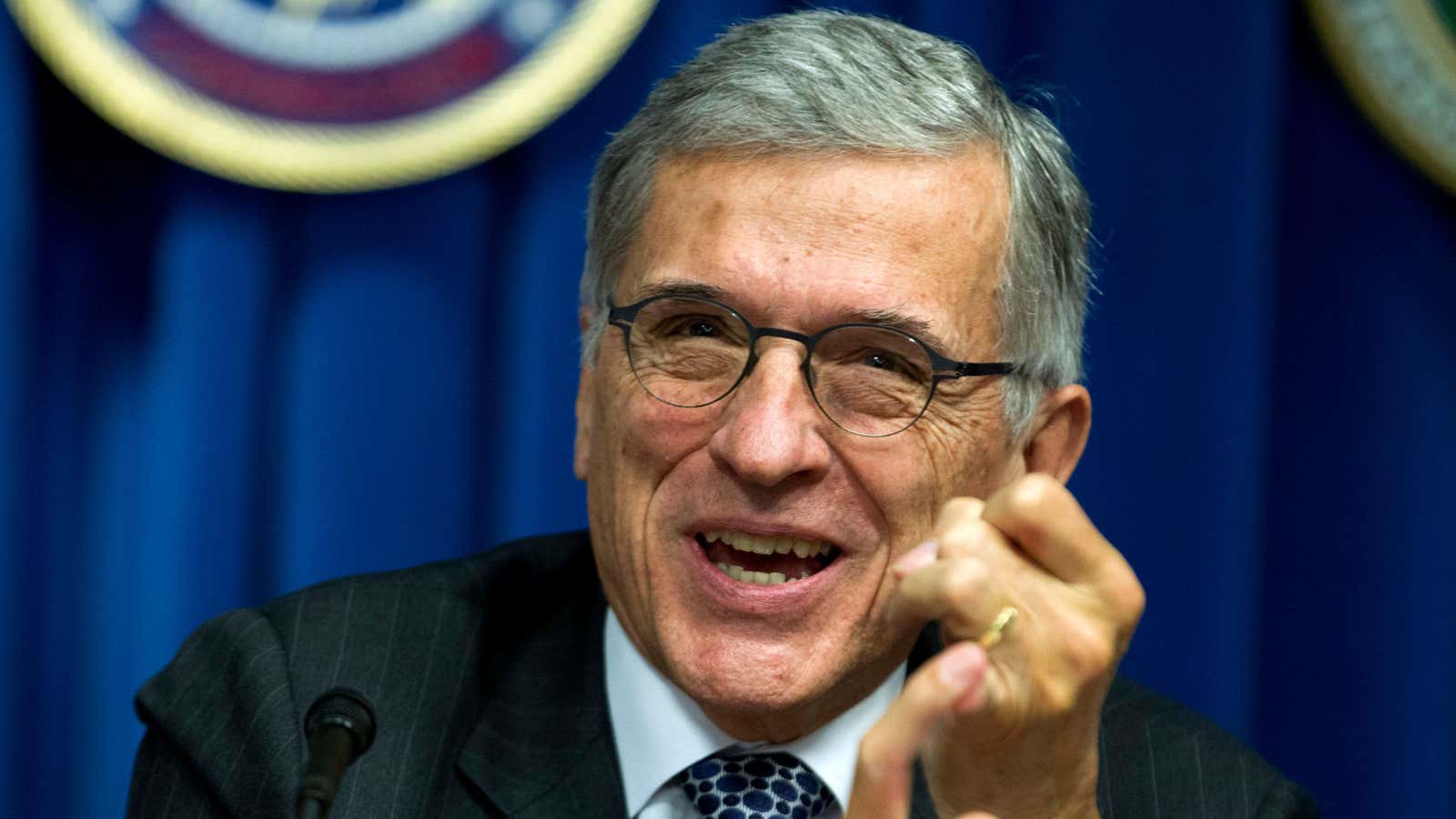US telecom regulators are set to vote Thursday (Feb. 26) to enforce net neutrality, the idea—backed by the White House and by content providers ranging from Netflix to Major League Baseball—that all data should be treated equally by internet service providers. A vote in the affirmative would usher in rules preventing internet providers from selling data “fast lanes” to customers who are willing and able to pay for the privilege.
Already, critics are suggesting that the new rules will create a burden akin to (or worse than) the sweeping health care reform law Congress enacted in 2010.
But that’s a flawed argument.
What Obamacare did
The health care overhaul changed the way that the government spends hundreds of billions of dollars to pay for health care, in an attempt to protect the US budget from the growing cost of health care and to give more Americans access to health insurance. Congress wrote a law requiring all Americans to get medical coverage, and created subsidies—paid for by new taxes—to make the coverage more affordable. It also set up new marketplaces for purchasing the insurance, set rules regarding how insurance companies could treat their clients and how Medicare could pay doctors and hospitals, and expanded Medicaid coverage for poor Americans.
What “net neutrality” will, and won’t, do
Some major differences right off the bat: No new laws, no new taxes, and no new spending.
Congress already passed a law, in 1996, giving the Federal Communications Commission the authority to do what its chairman, Tom Wheeler, expects the agency to do Thursday, which is change a legal framework. Rather than thinking about companies that sell internet service as providing “information services,” they will see them as providing “telecommunications services.”
Most people wouldn’t blink an eye at Comcast, AT&T, and Verizon being classified as telecoms (indeed, the latter two arguably are better known for their phone service than anything else). But the distinction makes all the difference in terms of the FCC’s ability to get these companies—and other internet service providers—to treat all the data on their networks equally. When the FCC tried to force internet service providers to do this in 2010, without calling them telecommunications services, the companies sued to block the law and won—because the government can only put those kinds of restrictions on telecommunications services.
What really had the companies worried was the prospect of the FCC regulating prices for all of their services. But no one sees that as ideal, and the FCC already has said it will formally renounce its rate-setting powers, along with its ability to level fees, a process called forbearance. While some have argued that this won’t work, Sprint, which has broken ranks with the rest of the US telecom industry to endorse the kind of rules the FCC is proposing, says forbearance worked fine in the mobile phone market, for instance.
Middle ground
One big difference between the debate over health care reform and the debate over net neutrality is that a lot of Obamacare’s opponents, conservatives mainly, just plain disagreed with the point of the health care law. They didn’t think the government had any business interfering in the insurance market in the first place. That’s one reason why there has been so little success developing a Republican alternative to Obamacare.
But when it comes to net neutrality, there’s already a lot of agreement. Public opinion polling shows that net neutrality isn’t a partisan issue, with Republicans and Democrats both supporting it. And the companies involved complied with the three main rules the FCC wants to put in place from 2010 until last year: No blocking lawful content; no slowing data delivery based on content, device or service; and no “paid prioritization,” or fast lanes that favor some internet traffic over other traffic. This, the FCC says, will protect young companies from barriers to growth and internet users from discrimination.
Comcast has even noted in its campaign against the rules that it already is following them as a result of its merger with NBC, though that constraint expires in 2018. Even some Republican lawmakers have had a last-minute conversion, saying they are willing to rewrite telecommunications law to enforce net neutrality, so the FCC won’t re-classify internet service providers.
What would Obamacare for the internet look like?
Telecom lobbyists and their allies know the first step toward killing the new rules is making it a partisan issue, and they can do that just by putting the president’s name on it—hence Obamanet. That’s also why members of Congress are launching an investigation into communications between the White House and the FCC. The theory of their case is that the White House inappropriately influenced the independent agency when the president endorsed the new approach, but since the framework chosen by Wheeler has been on the table throughout the process, proving such allegations will be difficult.
For the sake of a thought experiment, consider what Obamacare for the internet might look like: It would start with the recognition that internet costs are spiraling out of control and costing the public too much. The government might decide to write a law requiring internet service providers cut costs and do more to expand access, but in return, it would require all Americans to pay for internet access, in turn requiring new subsidies and taxes. The government might decide to set up its own public network to compete with the incumbents and drive down prices, or invest in a public-private partnership to provide internet access, as Australia did.
Either way, the new net neutrality rules are nothing like the health care overhaul. All they ask is that the private companies who sell internet services to consumers treat their customers equally. It’s not a policy without costs to those companies or without potential unintended consequences, but it doesn’t need to be a partisan brawl, either.
